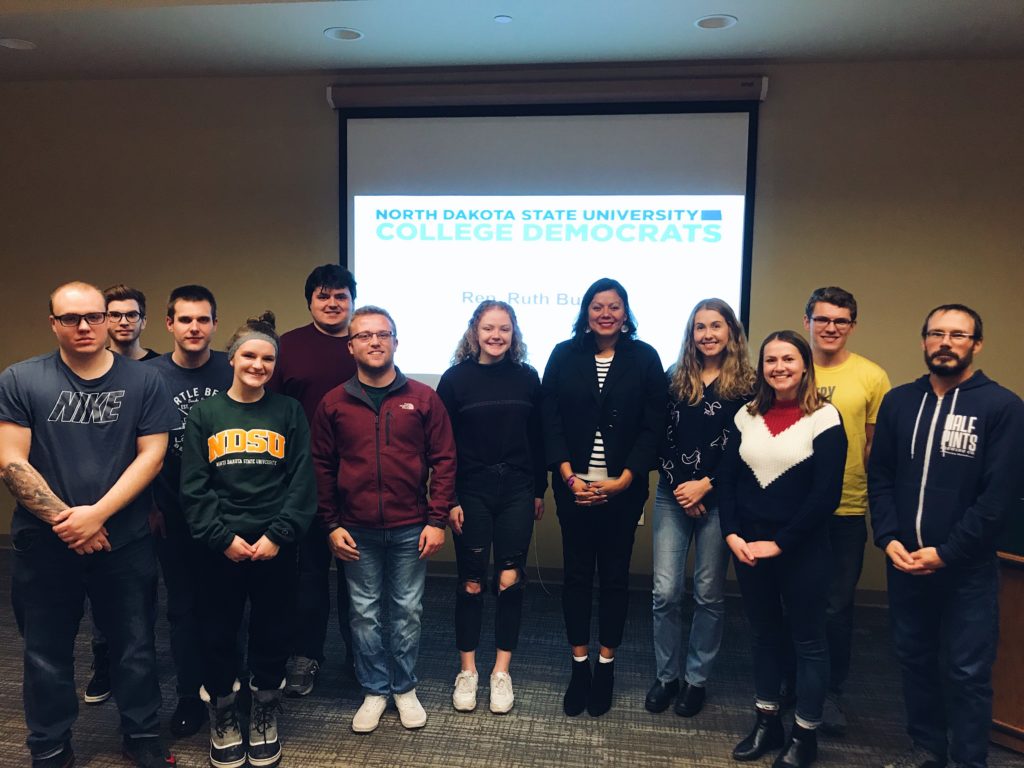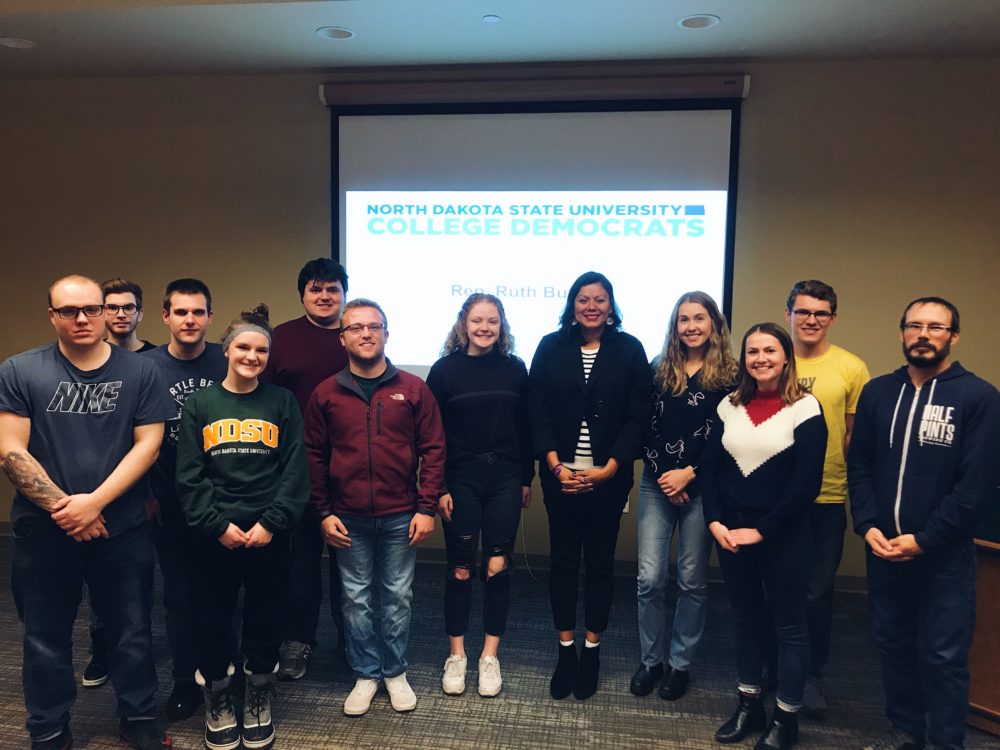
Representative Ruth Buffalo poses with College Democrats members
The last meeting of the semester for College Democrats
On Dec. 5, North Dakota State University College Democrats held their last meeting of the semester. President of College Democrats, Taylor Spreeman, led the meeting while North Dakota House of Representatives District 27 member, Ruth Buffalo, and College Democrats Secretary, Karolina Lindvall, presented at the meeting.
Spreeman highlighted news about the 2020 Democratic campaign and the remaining candidates in the race as Representative Buffalo discussed the voting habits and challenges Native Americans face at the polls.
Buffalo discussed the impacts of the N.D. Voter Registration law signed by Governor Dough Burgum in 2017. The law requires voters to have an ID with a current residential address to vote, though many Native Americans don’t have a residential address on their ID’s. Most, instead, have P.O. box addresses.
“Dropping that ruling three weeks prior to the general election, leaving communities scrambling, really wasn’t good business any way you look at it,” Buffalo said.
Buffalo testified during a Congressional field hearing held in Standing Rock in April 2019 about the law. The hearing included members of Congress as well as tribal leaders and tribal elected officials.
“It was almost like saying ‘Well your kids are educated what are you complaining about?’ “
N.D. House of Representatives District 27 member Ruth Buffalo
“One of the questions a ranking [Congress] member had asked was ‘If voter turnout was at a record high in the past election what are we complaining about?’ ” Buffalo said.
“It really took me back to how my ancestors felt. I thought about the older generations of Native Americans, who were unfortunately forced out of their homes to attend boarding schools to become civilized and educated. It was almost like saying ‘Well your kids are educated what are you complaining about?’ ”
Another issue Native Americans face when voting is access to places to vote. Fort Berthold Reservation contains six counties: Dunn, McKenzie, McLean, Mercer, Mountrail and Ward.
Before the midterm elections, on the Fort Berthold Reservation, two past polling places were closed. One of those closed polling locations was in the town of Mandaree. Mandaree is separated into two counties, Dunn and McKenzie county.
After the closing of that polling location, Dunn county residents then had to travel to the town of Dunn Center to vote. Dunn Center is 42 miles away from Mandaree. The other closed polling place was in Four Bears.
“It really added a huge burden to an extremely vulnerable population,” Buffalo said. “It kept a lot of people home and not going to the polls.”
Lindvall, who is a Swedish foreign exchange student, then presented on the political system in place in Sweden which is a constitutional monarchy.
While Sweden has a King, legislation is drafted and passed through a parliamentary system. In Swedish politics, parliament is elected by popular vote.
After parliament is established, the parliament elects the Prime Minister. The Prime Minister then decides who will be in cabinet positions. Cabinet Ministers focus on specific areas within Swedish society. These areas range from defense to culture. There are 22 ministers in the Swedish system.
Lindvall also presented some of the differences between the United States and Sweden. Swedish colleges and universities are tuition-free and a government stipend is given to students that translates to around $340 per month. The Swedish government also offers student loans at an interest rate of 0.6 percent.
“Most people take out loans to pay for things like rent or food,” Lindvall said. “Most people actually don’t work during their studies. They are focusing on their studies or extracurriculars.”
Sweden also caps prescription costs at approximately $240 and outpatient care at approximately $120.
Sweden pays for these amenities through higher taxes. The base income tax for all Swedes is 32 percent. For those making between $51,730.52 to $72,652.50 pay an extra 20 percent and for those making anything above that pay an extra 25 percent.
As the next democratic debate is approaching on Dec. 19, only six of the remaining 15 candidates have qualified for the debate.
Candidates Joe Biden, Pete Buttigieg, Amy Klobuchar, Bernie Sanders, Tom Steyer and Elizabeth Warren have all qualified for the December debate so far.
The debate is to take place in Los Angles and will be co-hosted by POLITICO and PBS NewsHour. Other campaign news included senator Kamala Harris dropping out of the presidential race.
“My campaign for president simply does not have the financial resources to continue,” Harris said in a video released by her campaign. “But I want to be clear with you, I’m still very much in this fight. And I will keep fighting every day for what this campaign has been about.”
The Buttigieg campaign also accepted thousands of dollars from lawyers Alexandra Walsh and Beth Wilkinson. Walsh and Wilkinson represented Supreme Court Justice Brett Kavanaugh during his confirmation hearings. The Buttigieg campaign is in the process of returning the donations.
Meetings for College Democrats will continue after Christmas break. In the spring semester, College Democrats will be doing more “Get Out the Vote” work to increase voter turnout in the 2020 election as well as educate about current candidates by hosting debate-watch parties.
If students would like to get involved with College Democrats, meetings are open to all students as they will be holding a special election for the secretary position for the spring semester after Christmas break.
“If students are wanting to get more involved in politics, they have a home with NDSU College Democrats,” Spreeman said.
